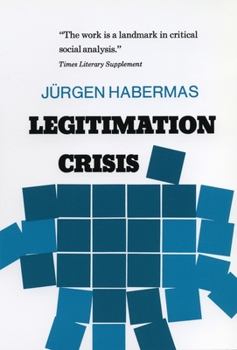Legitimation Crisis
Select Format
Select Condition 
Book Overview
Critical Theory originated in the perception by a group of German Marxists after the First World War that the Marxist analysis of capitalism had become deficient both empirically and with regard to its consequences for emancipation, and much of their work has attempted to deepen and extend it in new circumstances. Yet much of this revision has been in the form of piecemeal modification. In his latest work, Habermas has returned to the study of capitalism,...
Format:Paperback
Language:English
ISBN:0807015210
ISBN13:9780807015216
Release Date:August 1975
Publisher:Beacon Press
Length:196 Pages
Weight:0.47 lbs.
Dimensions:0.5" x 5.5" x 8.5"
Customer Reviews
2 ratings
A major work by Habermas: Is its thesis convincing?
Published by Thriftbooks.com User , 17 years ago
Jurgen Habermas' Legitimation Crisis explores crisis tendencies in late capitalism and the possible order that might follow. Crises themselves come about from unresolved problems that begin to raise questions about the nature and efficacy of the system. When people lose faith in the values undergirding a system, the regime in power and, perhaps, even the entire system itself comes to be at risk. The underlying engine of crisis is the economic system. He notes that "In liberal capitalism, crises appear in the form of unresolved economic steering problems" and ". . .crises become endemic because temporarily unresolved steering problems, which the process of economic growth produces at more or less regular intervals, as such endanger social integration." Economic crisis might occur when output declines and its distribution becomes increasingly unequal, so disproportionate that it raises questions about the fairness and viability of the system. In this way, the ideology supporting capitalism would come under question and cease generating loyalty from the people. If government capabilities are questioned too much by citizens, crisis develops, and people come to lose faith in the ideology supporting the system and the system's legitimacy in dividing up the pie so that all gain "fairly." People will not be actively involved in politics as long as their careers, family lives, and enjoyment of consuming material goods continue. Under such circumstances, they allow the capitalist economy and government to operate with rather little question. By providing an appropriate level of "goodies" to the people, the system renders the masses quiescent and allows the elite to remain in power. When questions arise as to whether the system is generating consumer goods at the proper rate, then the political disengagement may end and a legitimation crisis begins as people begin to doubt the validity of the current system. Habermas' ideal system would be based on dialogic communication and open discourse. The question here: If the current late capitalist system suffers a legitimation crisis and transformation of the system looms, how will new norms develop? Habermas answers: "Only communication ethics guarantees the generality of admissible norms and the autonomy of acting subjects solely through the discursive redeemability of the validity claims with which norms appear. That is, generality is guaranteed in that the only norms that may claim generality are those on which everyone affected agrees (or would agree) without constraint if they enter into (or were to enter into) a process of discursive will-formation." Citizens will test the validity claims of the various ideas and norms under debate. In the final analysis, "The validity claim of norms is grounded not in the irrational volitional acts of the contracting parties, but in the rationally motivated recognition of norms, which may be questioned at any time." And what determines which validity clai
Habermas' Opus is Timely!
Published by Thriftbooks.com User , 24 years ago
The German political and social philosopher Jurgen Habermas is heir to the semantically rich tradition of Frankfurt School thinkers. These men (and sadly, they are mainly men, although Hannah Arendt is in some sense in this circle) were seriously threatened by the collapse of the Weimar Republic. Their decision to go into exile in the United States should probably be controversial. Habermas is profoundly influenced by Marx, Weber, Freud, and Talcott Parsons, and wrote this book in the context of uprisings against the Viet Nam War. What we are seeing right now, Bush versus Gore in a contested election in which the very structure of the United States government is being questioned, could be illuminated by careful study of this book. I commend it to the attention of anyone who would better understand a moment in United States history which has been descibed as a constitutional crisis.






